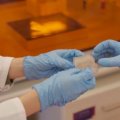Harriman's Soviet experience helped end the Cold War
A University of Queensland thesis on the well-known American ambassador W. Averell Harriman is believed to be the first scholarly interpretation of his diplomatic career.
Dr Yeong-Han Cheong said Mr Harriman's life was a metaphor for American foreign policy in the 20th century spanning World War I to the end of the Cold War.
The History Department thesis describes and examines the course of Mr Harriman's diplomatic career under four Democratic presidents, from the early Cold War era to the last stages of the Vietnam War.
To complete the thesis, Dr Cheong had access to the Harriman Papers including personal diaries, memos and White House official files only released to the public in 1986. The papers were donated to the Library of Congress in Washington DC by his family following Mr Harriman's death. Dr Cheong's thesis represents the first account of Mr Harriman's diplomatic career since the papers were released to the public.
To study the papers, Dr Cheong visited the Library of Congress and several presidential libraries.
The study investigates the path to Mr Harriman's success. Dr Cheong said the thesis revealed that it was the ambassador's personal character and negotiating skills which brought him success.
"He travelled to the Soviet Union when few Americans did. He learned through his business experience that the Soviets were not easy to deal with. Before long his experience with the Soviets was realised by four Democratic presidents," Dr Cheong said.
"Mr Harriman's diplomacy, particularly in the Cold War period, laid the basis of the alliance diplomacy and conventional and nuclear deterrence that would ultimately win the Cold War in 1991, 74 years after Lenin's coup d'etat."
For more information, contact Dr Cheong (telephone 07 3875 6793).
.jpg)



